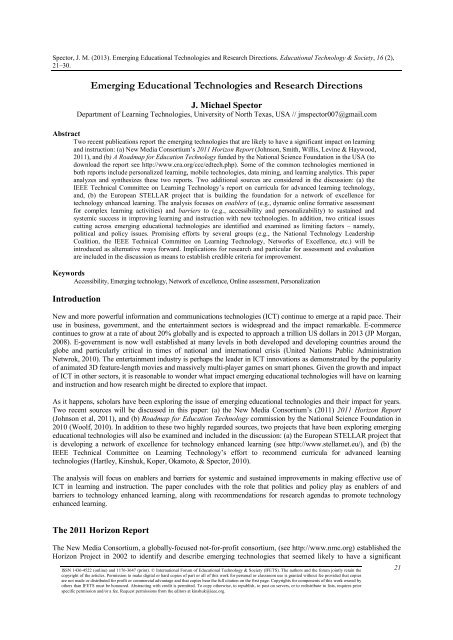Download Complete Issue in PDF - Educational Technology & Society
Download Complete Issue in PDF - Educational Technology & Society
Download Complete Issue in PDF - Educational Technology & Society
You also want an ePaper? Increase the reach of your titles
YUMPU automatically turns print PDFs into web optimized ePapers that Google loves.
Spector, J. M. (2013). Emerg<strong>in</strong>g <strong>Educational</strong> Technologies and Research Directions. <strong>Educational</strong> <strong>Technology</strong> & <strong>Society</strong>, 16 (2),<br />
21–30.<br />
Emerg<strong>in</strong>g <strong>Educational</strong> Technologies and Research Directions<br />
J. Michael Spector<br />
Department of Learn<strong>in</strong>g Technologies, University of North Texas, USA // jmspector007@gmail.com<br />
Abstract<br />
Two recent publications report the emerg<strong>in</strong>g technologies that are likely to have a significant impact on learn<strong>in</strong>g<br />
and <strong>in</strong>struction: (a) New Media Consortium’s 2011 Horizon Report (Johnson, Smith, Willis, Lev<strong>in</strong>e & Haywood,<br />
2011), and (b) A Roadmap for Education <strong>Technology</strong> funded by the National Science Foundation <strong>in</strong> the USA (to<br />
download the report see http://www.cra.org/ccc/edtech.php). Some of the common technologies mentioned <strong>in</strong><br />
both reports <strong>in</strong>clude personalized learn<strong>in</strong>g, mobile technologies, data m<strong>in</strong><strong>in</strong>g, and learn<strong>in</strong>g analytics. This paper<br />
analyzes and synthesizes these two reports. Two additional sources are considered <strong>in</strong> the discussion: (a) the<br />
IEEE Technical Committee on Learn<strong>in</strong>g <strong>Technology</strong>’s report on curricula for advanced learn<strong>in</strong>g technology,<br />
and, (b) the European STELLAR project that is build<strong>in</strong>g the foundation for a network of excellence for<br />
technology enhanced learn<strong>in</strong>g. The analysis focuses on enablers of (e.g., dynamic onl<strong>in</strong>e formative assessment<br />
for complex learn<strong>in</strong>g activities) and barriers to (e.g., accessibility and personalizability) to susta<strong>in</strong>ed and<br />
systemic success <strong>in</strong> improv<strong>in</strong>g learn<strong>in</strong>g and <strong>in</strong>struction with new technologies. In addition, two critical issues<br />
cutt<strong>in</strong>g across emerg<strong>in</strong>g educational technologies are identified and exam<strong>in</strong>ed as limit<strong>in</strong>g factors – namely,<br />
political and policy issues. Promis<strong>in</strong>g efforts by several groups (e.g., the National <strong>Technology</strong> Leadership<br />
Coalition, the IEEE Technical Committee on Learn<strong>in</strong>g <strong>Technology</strong>, Networks of Excellence, etc.) will be<br />
<strong>in</strong>troduced as alternative ways forward. Implications for research and particular for assessment and evaluation<br />
are <strong>in</strong>cluded <strong>in</strong> the discussion as means to establish credible criteria for improvement.<br />
Keywords<br />
Accessibility, Emerg<strong>in</strong>g technology, Network of excellence, Onl<strong>in</strong>e assessment, Personalization<br />
Introduction<br />
New and more powerful <strong>in</strong>formation and communications technologies (ICT) cont<strong>in</strong>ue to emerge at a rapid pace. Their<br />
use <strong>in</strong> bus<strong>in</strong>ess, government, and the enterta<strong>in</strong>ment sectors is widespread and the impact remarkable. E-commerce<br />
cont<strong>in</strong>ues to grow at a rate of about 20% globally and is expected to approach a trillion US dollars <strong>in</strong> 2013 (JP Morgan,<br />
2008). E-government is now well established at many levels <strong>in</strong> both developed and develop<strong>in</strong>g countries around the<br />
globe and particularly critical <strong>in</strong> times of national and <strong>in</strong>ternational crisis (United Nations Public Adm<strong>in</strong>istration<br />
Netwrok, 2010). The enterta<strong>in</strong>ment <strong>in</strong>dustry is perhaps the leader <strong>in</strong> ICT <strong>in</strong>novations as demonstrated by the popularity<br />
of animated 3D feature-length movies and massively multi-player games on smart phones. Given the growth and impact<br />
of ICT <strong>in</strong> other sectors, it is reasonable to wonder what impact emerg<strong>in</strong>g educational technologies will have on learn<strong>in</strong>g<br />
and <strong>in</strong>struction and how research might be directed to explore that impact.<br />
As it happens, scholars have been explor<strong>in</strong>g the issue of emerg<strong>in</strong>g educational technologies and their impact for years.<br />
Two recent sources will be discussed <strong>in</strong> this paper: (a) the New Media Consortium’s (2011) 2011 Horizon Report<br />
(Johnson et al, 2011), and (b) Roadmap for Education <strong>Technology</strong> commission by the National Science Foundation <strong>in</strong><br />
2010 (Woolf, 2010). In addition to these two highly regarded sources, two projects that have been explor<strong>in</strong>g emerg<strong>in</strong>g<br />
educational technologies will also be exam<strong>in</strong>ed and <strong>in</strong>cluded <strong>in</strong> the discussion: (a) the European STELLAR project that<br />
is develop<strong>in</strong>g a network of excellence for technology enhanced learn<strong>in</strong>g (see http://www.stellarnet.eu/), and (b) the<br />
IEEE Technical Committee on Learn<strong>in</strong>g <strong>Technology</strong>’s effort to recommend curricula for advanced learn<strong>in</strong>g<br />
technologies (Hartley, K<strong>in</strong>shuk, Koper, Okamoto, & Spector, 2010).<br />
The analysis will focus on enablers and barriers for systemic and susta<strong>in</strong>ed improvements <strong>in</strong> mak<strong>in</strong>g effective use of<br />
ICT <strong>in</strong> learn<strong>in</strong>g and <strong>in</strong>struction. The paper concludes with the role that politics and policy play as enablers of and<br />
barriers to technology enhanced learn<strong>in</strong>g, along with recommendations for research agendas to promote technology<br />
enhanced learn<strong>in</strong>g.<br />
The 2011 Horizon Report<br />
The New Media Consortium, a globally-focused not-for-profit consortium, (see http://www.nmc.org) established the<br />
Horizon Project <strong>in</strong> 2002 to identify and describe emerg<strong>in</strong>g technologies that seemed likely to have a significant<br />
ISSN 1436-4522 (onl<strong>in</strong>e) and 1176-3647 (pr<strong>in</strong>t). © International Forum of <strong>Educational</strong> <strong>Technology</strong> & <strong>Society</strong> (IFETS). The authors and the forum jo<strong>in</strong>tly reta<strong>in</strong> the<br />
copyright of the articles. Permission to make digital or hard copies of part or all of this work for personal or classroom use is granted without fee provided that copies<br />
are not made or distributed for profit or commercial advantage and that copies bear the full citation on the first page. Copyrights for components of this work owned by<br />
others than IFETS must be honoured. Abstract<strong>in</strong>g with credit is permitted. To copy otherwise, to republish, to post on servers, or to redistribute to lists, requires prior<br />
specific permission and/or a fee. Request permissions from the editors at k<strong>in</strong>shuk@ieee.org.<br />
21

















